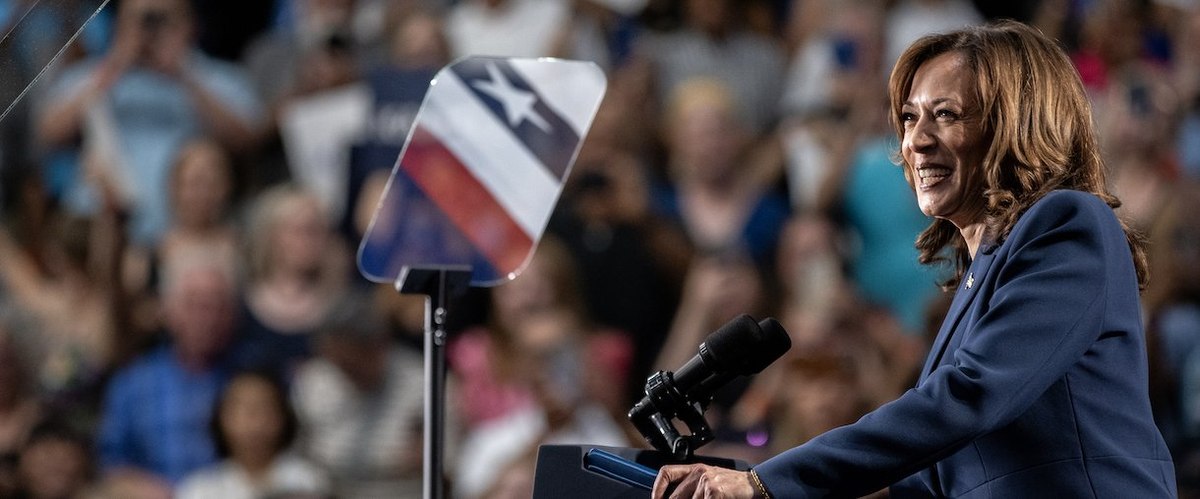When Joe Biden announced he was stepping aside as the Democratic nominee for president, many Democrats say they felt relieved and optimistic, according to a survey conducted just after he left the race on July 21. Others described themselves as sad and grateful. The July 22 - 25 survey, begun just a day after Biden exited on July 21, shows that the vast majority of Democrats — 80% — strongly or somewhat approve of the president's decision. Most Democrats (70%) want Kamala Harris as the party's new nominee, and nearly as many (67%) say that she is very likely to become it. And the proportion of Democrats with positive feelings about the nomination process skyrocketed since just before Biden dropped out.
The Democratic nomination process
Democrats' feelings on the nomination process have changed dramatically in the aftermath of Biden's exit, with far more now saying they are optimistic than in the days leading up to it. Just before Biden's decision to step aside, just 17% of Democrats said they felt optimistic about this year's Democratic nomination process. After Biden stepped aside, 51% did, a 34-percentage-point increase in the span of just a few days. The shares saying they felt several other positive emotions also increased: excited (+26), confident (+16), inspired (+16), or satisfied (+12).
At the same time, there has been a decline in the shares of Democrats saying the nomination process makes them feel worried (-30), disappointed (-18), anxious (-17), and exhausted (-17).
Enthusiasm about each party and its elected officials has been increasing among the Americans who identify with the party, over a longer period of time. More Americans now say they're enthusiastic about the future of their party than did during similar points during the 2016 and 2020 election years. Americans' enthusiasm for elected officials from their party also has grown. The increases in enthusiasm for party and elected officials has been particularly large among among Republicans since just before Donald Trump was elected president in 2016.
How should the Democratic Party proceed with its nomination process? Democrats are twice as likely to prioritize quickly unifying the party around one candidate (64%) over ensuring that all viable candidates have a chance to compete (32%).
Most expect the Democratic Party's presidential nomination process to be to the benefit of Harris (78%), with fewer saying it will be competitive (44%). Majorities of Democrats think the party will be successful at nominating the candidate with the best chance of winning (71%), and that it will be quick (70%), transparent (64%), and unifying (62%). Slightly more say it will be fair to Democratic voters (68%) than to potential Democratic candidates (63%).
Whose policies Americans agree with
Our polling in the aftermath of Biden's departure finds that Harris, now the Democratic frontrunner, trails Trump by a few points. That gap could change as Americans learn more about Harris and her positions on various issues. In general, the public is less familiar with her policy positions than they are with Trump's.
On abortion, more say they always or usually align with Harris than with Trump (39% vs. 32%). On the environment and the Ukraine-Russia conflict, more say their positions usually align with Trump than with Harris, but more also say their positions rarely or never align with Trump than with Harris. On all other issues included in the poll — crime, the Israeli-Palestinian conflict, the economy, and immigration — Trump leads Harris: Far more agree with him and fewer disagree.
The survey also asked Americans which three out of 10 issues Harris is most experienced with, and which three she has the least experience with. The largest shares selected criminal justice (33%) and abortion (26%) as the issues she has the most background in. Foreign policy (37%), the economy (34%), and immigration (27%) are the issues Americans are most likely to say Harris has the least experience in.
In her first campaign appearance since becoming the presumptive nominee, Harris emphasized her record prosecuting criminals, drawing a distinction with the recent criminal conviction of her opponent, Trump. A survey of U.S. adults just after her appearance finds that while most Americans agree that Trump is more likely to have committed crimes than Harris is, more think Trump than Harris is likelier to be tough on crime. More Republicans say Harris is likelier than Trump to have committed a crime than say Trump is likelier (35% vs. 22%).
In her speech, Harris also drew a distinction between what she describes as her optimistic vision for the country's future and what she characterizes as Trump's desire to return to the past. By 43% to 40%, Americans are slightly more likely to say that Harris, rather than Trump, has a more optimistic vision.
Americans see the ideologies of Harris and Biden similarly: 60% of Americans describe Harris as very or somewhat liberal, compared to 58% who describe Biden that way. On the Republican ticket, 59% view JD Vance as very or somewhat conservative and 60% say Donald Trump is. Among Democrats, 49% see Harris as liberal and 47% view Biden as liberal. Republicans overwhelmingly describe Harris (84%) and Biden (85%) as liberal, and are more likely than Democrats to call both of them very liberal. Large shares of Democrats and Republicans describe Vance and Trump as conservative, though Democrats are more likely to characterize them as very conservative.
Related:
- Harris vs. Trump: How Americans evaluate them on personality and policy
- Snap poll: Most Americans approve of Biden ending his re-election campaign
- If Biden steps aside, whom Democrats would want to replace him — and how
- How views of Biden and Trump changed after the first debate
- Snap post-debate poll: 30% of Democrats say 'someone else' would be a stronger candidate than Biden
See the results for this YouGov poll
Methodology: This poll was conducted online on July 22 - 25, 2024 among 1,107 U.S. adult citizens. Respondents were selected from YouGov’s opt-in panel using sample matching. A random sample (stratified by gender, age, race, education, geographic region, and voter registration) was selected from the 2019 American Community Survey. The sample was weighted according to gender, age, race, education, 2020 election turnout and presidential vote, baseline party identification, and current voter registration status. Demographic weighting targets come from the 2019 American Community Survey. Baseline party identification is the respondent’s most recent answer given prior to November 1, 2022, and is weighted to the estimated distribution at that time (33% Democratic, 31% Republican). The margin of error for the overall sample is approximately 4%.
Image: Getty










